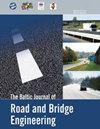利用塑胶废物及再生沥青促进可持续发展
IF 1.1
4区 工程技术
Q4 ENGINEERING, CIVIL
引用次数: 6
摘要
原始材料成本的增加,资源的减少和塑料废物的增加使研究的势头转向可持续和绿色路面。建筑行业的再生沥青路面(RAP)和塑料废物处理是巴基斯坦和其他发展中国家面临的主要问题,因为它们面临着建设、维修和修复广泛道路网络的资金减少。在本研究中,试图研究利用再生沥青路面和塑料废物来解决这些问题。用三种不同含量(2%、4%和6%)的聚对苯二甲酸乙二醇酯和三种含量(20%、30%和40%)的再生沥青路面对初粘合剂进行改性。改性粘合剂的常规性能由渗透和软化点决定。同时,采用热重分析法对其热稳定性进行了校核,并利用动态剪切流变仪对其抗车辙性能进行了校核。结果表明,改性后的粘结剂在470℃温度下仍保持稳定,抗车辙性能有所提高。确定了马歇尔混合料的性能,并与巴基斯坦国家公路管理局的规格进行了比较。4%聚对苯二甲酸乙二醇酯和30%再生沥青路面的马歇尔稳定性最佳,而流动和空气空隙保持在限制范围内。结果表明,塑料垃圾在沥青路面中的利用提高了沥青路面的性能,并有助于减少再生沥青路面和塑料垃圾造成的环境污染和垃圾填埋问题。本文章由计算机程序翻译,如有差异,请以英文原文为准。
Use of Plastic Wastes and Reclaimed Asphalt for Sustainable Development
The increased cost of virgin material, declining resources and increasing plastic wastes have turned the research momentum towards sustainable and green pavements. Reclaimed Asphalt Pavement (RAP) from the construction industry and plastic wastes disposal is the main problem for Pakistan as well as other developing countries in the face of fewer funds for the construction, repair, and rehabilitation of the extensive road network. In this research, the attempt has been made to study the use of Reclaimed Asphalt Pavement and plastic wastes to counter these issues. Virgin binder was modified with three different contents (2%, 4%, and 6%) of Polyethylene Terephthalate and three contents (20%, 30%, and 40%) of Reclaimed Asphalt Pavement. Conventional properties of the modified binder were determined by penetration and softening point. At the same time, thermal stability was checked by Thermal Gravimetric Analysis, and resistance against rutting was evaluated with the help of Dynamic Shear Rheometer. It is observed that modified binder remains stable up to a temperature of 470 °C and showed improved resistance against rutting. Marshall mix properties were determined and compared to specifications of the National Highway Authority of Pakistan. Optimum Marshall stability was observed with 4% Polyethylene Terephthalate, and 30% Reclaimed Asphalt Pavement, while flow and air voids remained in limits. As per the results, utilisation of plastic wastes in asphalt pavements enhances the performance and helps to reduce the environmental pollution and landfill problems due to Reclaimed Asphalt Pavement and plastic wastes.
求助全文
通过发布文献求助,成功后即可免费获取论文全文。
去求助
来源期刊
CiteScore
2.10
自引率
9.10%
发文量
25
审稿时长
>12 weeks
期刊介绍:
THE JOURNAL IS DESIGNED FOR PUBLISHING PAPERS CONCERNING THE FOLLOWING AREAS OF RESEARCH:
road and bridge research and design,
road construction materials and technologies,
bridge construction materials and technologies,
road and bridge repair,
road and bridge maintenance,
traffic safety,
road and bridge information technologies,
environmental issues,
road climatology,
low-volume roads,
normative documentation,
quality management and assurance,
road infrastructure and its assessment,
asset management,
road and bridge construction financing,
specialist pre-service and in-service training;

 求助内容:
求助内容: 应助结果提醒方式:
应助结果提醒方式:


